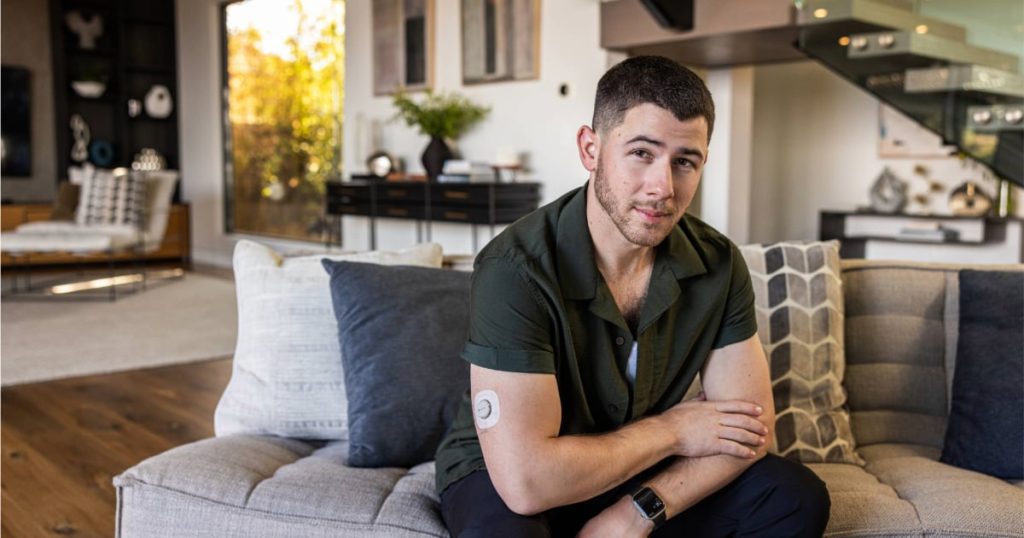:upscale()/2025/08/18/829/n/49351082/tmp_vr3Ar8_11f1e5423e46f2d0_Nick_Jonas_Main.png)
:upscale()/2025/08/18/829/n/49351082/tmp_vr3Ar8_11f1e5423e46f2d0_Nick_Jonas_Main.png)
When I hop on the phone with Nick Jonas, I’m hit with a wave of excitement and nostalgia. Just the night before our call, Jonas took the stage with his brothers to kick off their 20th anniversary tour and a new album release, “Greetings From Your Hometown.” That morning, a few hours before our call, I scrolled my Instagram feed and the entire internet was buzzing over the show, where special guests like Jesse McCartney, Demi Lovato, and the entire Jonas family graced the stage. I’m instantly transported to 17 years ago, when I saw the Jonas Brothers and Demi Lovato on tour in 2008. What can I say? I love a reunion, and it turns out, so does the rest of the world.
But behind all of the excitement (new tour, new album!) is a person who has lived with a chronic illness (type 1 diabetes, an autoimmune disease affecting the body’s ability to produce insulin) for 20 years, and from what I can tell, has never let it slow him down. When I talk with Nick Jonas, he opens up about his battle to be at peace, instead of at war, with his illness.
“The one big lesson I’ve learned in my now 20 years of living with this disease is that as on top of it as you are, there are some days where things just don’t go your way and you got to roll with the punches and just understand that it’s one of those moments,” Jonas tells me.
“”I’m not going to let it take over my life.”
With a tour schedule that would challenge anyone’s stamina, I ask Jonas how he prioritizes his health and wellness when life is extra busy. Jonas says he’s just getting his “sea legs” back in terms of touring, but staying on top of his diabetes management is his first priority.
“People that don’t live with diabetes, either type 1 or type 2, probably don’t understand how many decisions you have to make throughout the day. And they’re little micro-decisions,” he says, citing constantly calculating carbs, macronutrients, and insulin timing. “All these little things that add up throughout the course of the day. And a lot of your brain power is going towards the management of the disease,” Jonas adds. But in spite of this, he’s committed to his health and finding balance.
“I’ve had to learn at this 20-year mark to stay on top of it, do the best I can, but also take a step back from it and try to be present in the moment with my family, with my daughter, of course,” Jonas says. “I’m not going to let it take over my life.”
One tool that’s helped with that: his Dexcom glucose monitor. “Dexcom honestly has been a game-changer in being able to look down at my phone and see where I’m at in real time and even share that information with my family, my friends, who are my support system while out in the road,” he says.
:upscale()/2025/08/18/902/n/49351082/tmp_5owj48_c3cdd193fc3878d1_Nick_Jonas_Main-2.png)
:upscale()/2025/08/18/902/n/49351082/tmp_5owj48_c3cdd193fc3878d1_Nick_Jonas_Main-2.png)
Other mainstays of his routine include working out and staying active. Jonas says his longtime trainer, Matt Blank, has been key to his success in finding a fitness routine that can take him from getting ready for a TV role to staying fit in a hotel room.
At one point in his career, Jonas had to put on 20 pounds of muscle for his role in “Kingdom,” a TV show where he played an MMA fighter. Now that he’s not on the show, Jonas says Blank helped him find a more sustainable routine that feels better for his everyday life. “My whole sort of fitness routine changed and he helped me craft something I could do in a hotel room or at a gym that made me feel good and gain energy,” Jonas says. In addition to gym workouts, he says he enjoys playing golf and tennis. “Anytime I can mix in something that feels like a game or it’s obviously a sport, it just makes it a more enjoyable experience than getting in the gym, grinding,” he notes.
His latest obsession? Hot yoga. “So that’s something I’m not an expert at by any means, but it just makes me feel good and kind of uplifts my spirit,” Jonas says. Prioritizing both mental and physical aspects of a fitness routine is “always a plus” for him.
Finally, Jonas says one of the biggest factors that has affected him the most on his chronic illness journey are the people in his life. “In the early stages of my diagnosis, I was very independent and wanted to take it all on myself, but I learned quickly that I needed the support of my family, my friends, and my doctors,” he says. His advice now is to do the exact opposite, encouraging newly diagnosed people to lean on your people. “And if you feel like you want to take it all on, that’s OK — but trust me, those people want to be there for you,” Jonas says.
In leaning on his supportive circle, he learned to let go of his desire to control or conquer his disease. “I think I realized that my best is the best I can do,” he says.
Mercey Livingston is a writer and editor with more than years of experience covering fitness, health, and nutrition for media outlets and brands including Well+Good, Shape, and Women’s Health. She was previously the Fitness Editor at Peloton, and held editorial roles at Equinox, Shape.com, and Well+Good. Mercey is a NASM-CPT and a NASM-certified Women’s Fitness Specialist. She is also a certified Holistic Health Coach through the Institute for Integrative Nutrition with an additional certification in Hormone Health. She has a BA in Journalism from The University of Southern Mississippi.

